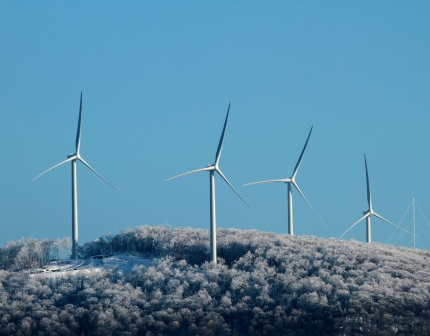Vermont Public Interest Research Group * Conservation Law Foundation * 350Vermont * Sierra Club Vermont Chapter * Vermont Natural Resources Council * Citizens Awareness Network * National Wildlife Federation’s Northeast Regional Center * Vermont Yankee Decommissioning Alliance
For Immediate Release: March 14, 2013
Montpelier, VT – Legislation that would make it more difficult to build renewable energy projects in Vermont could make it to the floor of the Senate for a vote next week. Groups interested in preserving the state’s natural resources and promoting cleaner alternatives to polluting fossil fuels and other dirty energy sources expressed their opposition to S.30 today, and urged senators to vote against the bill unless it is revamped substantially.
While the bill no longer contains a statewide moratorium on wind development as was initially proposed, it still contains provisions that could block even community-scale wind and solar projects. It allows for local or regional bans on clean energy to be established, despite the state’s long-term energy plan calling for ninety percent of the state’s power needs to be provided by renewable energy by 2050.
“Every day brings new evidence of the need for more clean energy resources, yet this bill continues to take Vermont in the wrong direction,” said Paul Burns, executive director of the Vermont Public Interest Research Group. “Not only is renewable power the right thing to do from an environmental and economic perspective, but the latest research continues to show overwhelming public support for wind development in the state.”
A statewide poll released by the Castleton Polling Institute in February confirmed strong public support for building renewable wind energy on Vermont ridgelines. The support for wind actually increased from 66 percent to 69 percent when the question specifically asked about wind power being developed in the respondent’s community. Fewer than one in five Vermonters oppose wind.
“VNRC believes that it’s appropriate that we find ways to strengthen reliance on local and regional planning to inform project development and decision making,” said Brian Shupe, executive director of the Vermont Natural Resources Council. “That’s why we’re grateful that the Energy Generation Siting Policy Commission — a commission we called on the Governor to create — is undertaking a thorough analysis of these issues right now. We think the state — and legislative initiatives — could and should benefit from that exhaustive analysis before we significantly change state policy, since doing so could have implications for things far beyond wind.”
Christopher Kilian, Vermont Director for Conservation Law Foundation, pointed out that S.30 would hold renewable energy projects to a higher standard than the transmission of energy from nuclear, coal, massive hydro, or other technologies into the state. “Vermont should not pass a law that treats dirty energy sources differently than clean renewable projects like wind and solar.”
“If anyone needed more proof of the urgency to address climate change, we got it in the latest study published in the journal Science, showing that the earth’s temperature increased as much in the past 100 years as it had cooled over the previous six thousand years,” said Charles McKenna, Executive Committee Member, Sierra Club Vermont Chapter and Upper Valley Group. “We all need to do our part and for Vermont that means wind and solar energy will be part of the solution.”
It’s not merely the negative climate impacts of S.30 that have activists and environmental leaders concerned about the bill. Groups that have focused on controversial energy projects like Vermont Yankee understand the importance of developing more sustainable solutions.
“Having worked for decades to promote cleaner and safer alternatives to nuclear power, I’m happy to see Vermont moving forward with renewable energy in a meaningful way,” said Deb Katz, executive director of Citizens Awareness Network. “Two years ago, Fukushima gave us a glimpse of just how devastating a nuclear disaster could be. Today, many thousands of people are kept from returning to their homes due to radioactive threats. Wind and solar power are part of the sustainable energy future we need.”
“If it were possible to replace our reliance on fossil fuels and nuclear energy with small scale solar and community wind projects, I’d be all for it,” said Debra Stoleroff of Vermont Yankee Decommissioning Alliance. “But I know that if Vermont is serious about moving away from dirty energy, we’ll need to tap into all of the renewable energy resources available to us including wind, solar, hydro, geothermal and more.”
S.30 calls for a study focused on all of the potentially negative impacts of wind energy while failing to call for any evaluation of far more dangerous and polluting energy sources.
“Big energy changes are proposed for Vermont – tars sands transport through the Northeast Kingdom, a gas pipeline in Addison County, the development of renewables, among others. The climate crisis requires that we quickly transition from fossil fuels to cleaner energy options. S.30 would put extra obstacles in the path of renewables without providing a framework for universal, equitable, and transparent decision-making for all of our energy choices,” said Maeve McBride, organizer for 350Vermont.
“NWF believes that protecting Vermont’s environment and giving communities a voice in large development decisions is in no way incompatible with a plan to transition away from fossil fuels that are changing our climate and threatening our natural resources. In fact, we’re hopeful that Vermont can be a beacon for how to balance these interests appropriately. To that end, we believe that the Energy Siting Commission should be allowed to complete its important work before legislation like this is passed,” said Curtis Fisher, Regional Executive Director, NWF Northeast Regional Center.
###

